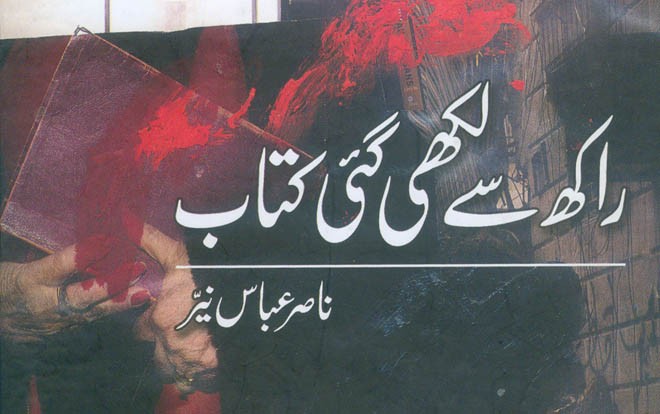
A third collection of short stories establishes that Nasir Abbas Nayyar’s is a definitive and unique voice in Urdu fiction

Nasir Abbas Nayyar’s third collection of short stories is out. It’s been nearly three years that his path-breaking first book of short stories Khaak Ki Mehek appeared. In effect, he has published one book of fiction a year since then. This is of course apart from works of criticism that he has been producing fairly regularly alongside. With every new fiction book and each new story, he is attempting something different in terms of theme, content and form. Yet, to me, his latest collection Raakh se Likhi Gai Kitab perfects the experiments he was trying to make in the second book Farishta Nahin Aya. The stories appear well-structured and more complete despite being postmodern in scope.
Like in the earlier two books, some stories are set in both rural and urban environment but in this particular one, there are quite a few that have primordial characters and settings like badshah, qazi, wazirs, khalifa, basti, caves, paintings, libraries and graveyards. In many cases, the characters don’t even have names because names do not matter when you’re dealing with concerns that are universal.
The prolific pen of a thinking mind makes use of this intelligent literary device to discuss the most contemporary and sensitive issues that are otherwise kept away from public eye. The almost invisible punishment wreaked on the few dissenters ensures that the control in society is exercised more in the form of self-censorship. Most journalism has fallen prey to this.
In an age of constant connectedness, largely through social media, and plenty of content to choose from, it might seem that keeping fiction apart and aloof from journalism is the real challenge. Yet, fiction offers this unique opportunity to tread where journalism fears to go. Nayyar has used this opportunity to deal with the intolerance and brutality around us, as well as censorship from outside and within, in his stories.
It is in this context that the dedication of the book "Dunya ki Sub Maon ke Naam (To all mothers of the world)" seems most appropriate. The missing or ‘disappeared’ sons recur in the stories. In ‘Maut Karobar hai’, there are references to the insensitivity of journalism in reporting tragedy, the focus on the number of deaths, of people becoming statistics, the need to look for more sensational, even brutal, news and then forgetting them and moving on. But there isn’t anything more moving than the description of the old mother who has been coming to the hospital’s morgue for two years, hoping her son’s dead body would land here. What if his dead body is mutilated like the others here, the narrator asks her, how then will she recognise her son to which she replies: "I know him from his hands, feet and chest, from the mark of injury on the index finger of his left hand…"
In ‘Yeh Khuda Kahan Naheen Rehte’, the next story and a powerful one, Nayyar takes us to another realm to show what happens to those who become invisible but are not killed. The blindfolded journey of a journalist to no-man’s land to be followed by solitary confinement are effectively narrated; but more so the mental journey of the ‘accused’, particularly his war of nerves against the psychological torture and delirious utterances reminding one of so many recent incidents of temporary disappearances that were used to silence the rest.
A story about a callous tradition possibly from ancient times is set in a graveyard. The ambience of the graveyard is haunting and the details so contemporary that different times appear to coexist in the moment the story is being told. In essence, it is all about the meaninglessness of life in a world where the powerful are pitched against the powerless, something that has not changed over time.
Also read: Figments of intellect
Another personal favourite is ‘Khamoshi ka Sur’. The possibilities of language and silence are both explored through an intellectual losing his voice after becoming a victim of Aphasia or something close. The story is as much about the emptiness contained in repetitive sounds as it is about old age and what all it entails.
Nasir Abbas Nayyar’s is a definitive and unique voice in Urdu fiction. He raises some important questions in the readers’ minds about art, faith, morality, old age, leaving them searching for both easy and uneasy answers. There is dilemma of a public sector university teacher in one story or the worth of knowledge being questioned by someone surrounded by books in another. It appears as if he has not let any thought escape from the clutches of his creative faculties and fertile imagination. These are indeed precious moments but, at times, one feels he needs to hold on to them a little longer and sift through them a little more to match the perfection of Khaak Ki Mehek.
Raakh se Likhi Gai Kitab
Author: Nasir Abbas Nayyar
Publisher: Sang-e-Meel Publications
Pages: 160
Price: 600